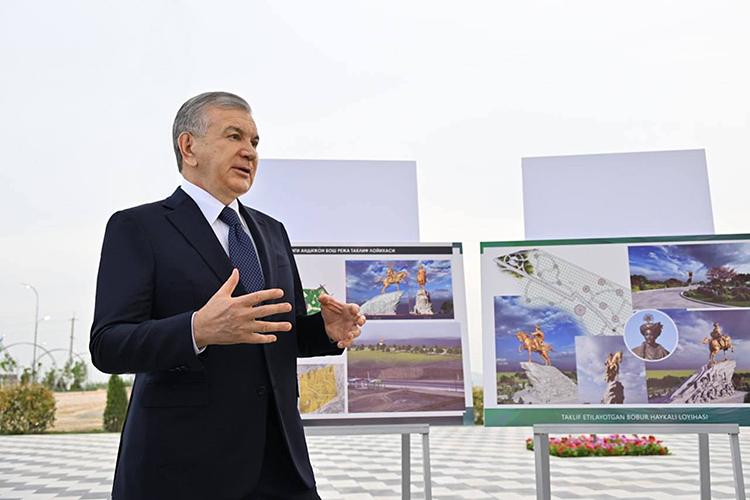
A city is being established in Uzbekistan in honor of the Mughal Emperor Babur
A city is being established in Uzbekistan in honor of the Mughal Emperor Babur
Zahiriddin Muhammad Babur, who emerged from Turkestan and conquered India, founding the great Mughal Empire there, has had his name given to a newly constructed city in his birthplace, Andijan.
While a new city named New Andijan began construction in 2021 near the city of Andijan in eastern Uzbekistan, the city will henceforth be called Babur.
During his visit to the Andijan region this week, President Shavkat Mirziyoyev inspected the ongoing construction works in the New Andijan city.
Meeting with the people of Andijan and local leaders, Mirziyoyev proposed naming the city after Babur—the founder of the Great Mughal Empire, a great poet, and statesman. The city's residents supported this proposal, and the city was officially named Babur.
In his speech, Mirziyoyev stated, “Babur is such a great person that not only streets and squares, but even a separate city should be named after him. Babur lived his life longing for his homeland, wherever he was in the world. Today, if I say that our great ancestor’s dreams have come true and that his soul has returned to his homeland, it would be accurate. Congratulations to us all on such a great and historic day.”
Turkish designers involved in city planning
According to information gathered from Uzbek authorities, Turkish designers were also involved in the planning and design of the new city, which is being built on an area of 4,000 hectares.
According to the multi-phase project still under construction, more than 2,000 residences will be built on 1,500 hectares, and parks and green areas will be created on 1,820 hectares. The remaining space will be used for industrial enterprises and infrastructure facilities.
So far, 63 multi-story residences, a school, a polyclinic, shopping centers, banks, infrastructure facilities, and some industrial enterprises have already been built. An additional 40 residences are expected to be completed by the end of the year.
New Uzbekistan Park and Babur statue to be built
In the city, New Uzbekistan Park is also being constructed. The 19-hectare park, where over 10,000 saplings have been planted, will include cinemas, concert halls, various attractions, and other entertainment venues.
According to the project, a large statue of Babur will be erected in the center of the park, and a thematic park dedicated to all rulers of the Babur Empire will also be created.
Once the construction in Babur city is completed, it will be able to accommodate 410,000 residents.
Born in Andijan, founded an empire in India
Born in Andijan in 1483, Babur Shah was a great statesman, poet, and writer who later founded the Babur Empire in India. He was a descendant of Timur on his father's side and of Genghis Khan on his mother's side.
After losing his father, the ruler of Fergana, at a young age, Babur ascended the throne at just 12 years old and achieved his first major military success at 14 by capturing Samarkand.
After being defeated in the battle for Samarkand by Muhammad Shaybani in 1504, Babur left Central Asia and took Kabul—the first target of his major campaign towards India.
In 1526, during his campaign in India, Babur defeated Delhi Sultan Ibrahim Lodi’s 100,000-strong army with just 12,000 soldiers, thus laying the foundation of the Babur Empire—ruled by the Timurid dynasty—which lasted for over three centuries in India.
One of the 16 Turkish imperial flags displayed at the Presidential Palace of the Republic of Turkey is that of the Babur Empire founded in India.
His Works
In addition to being a statesman, Babur Shah was also a poet, translator, and author. In his 47-year life, he left behind a rich literary and scientific legacy and is considered the most important poet of Chagatai literature after Alisher Navoi.
Zahiriddin Muhammad Babur authored the autobiographical Baburnama, as well as many ghazals, rubais, and poems compiled in his Divan-i Babur. He also wrote Mubayin on Islamic jurisprudence, the Arud Risalesi on prosody, and other works.
Another of Babur’s creations was the Baburi Script (Hatt-i Baburi), a writing system he invented by blending the Arabic and Uyghur alphabets. It is known that Babur used this script in correspondence with state officials and relatives, and even commissioned a Qur’an to be written in it.